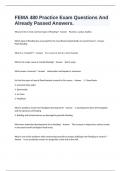Exam (elaborations)
FEMA 480 Practice Exam Questions And Already Passed Answers.
- Course
- Institution
What are the 3 most common types of flooding? - Answer Riverine, coastal, shallow Which type of flooding has accounted for the most flood-related deaths in recent history? - Answer Flash flooding What is a "meander?" - Answer It's a curve or turn in a river channel. What's the maj...
[Show more]



